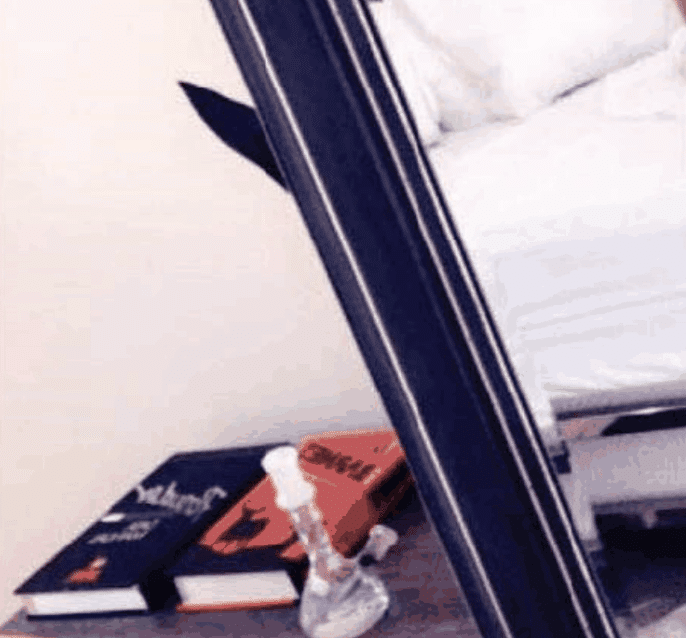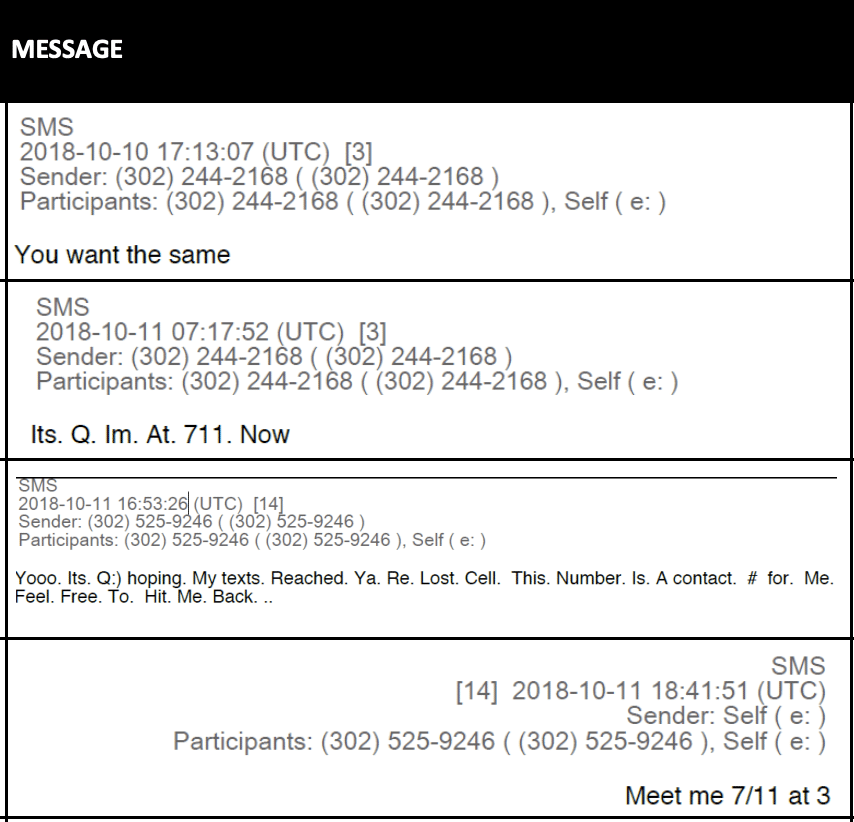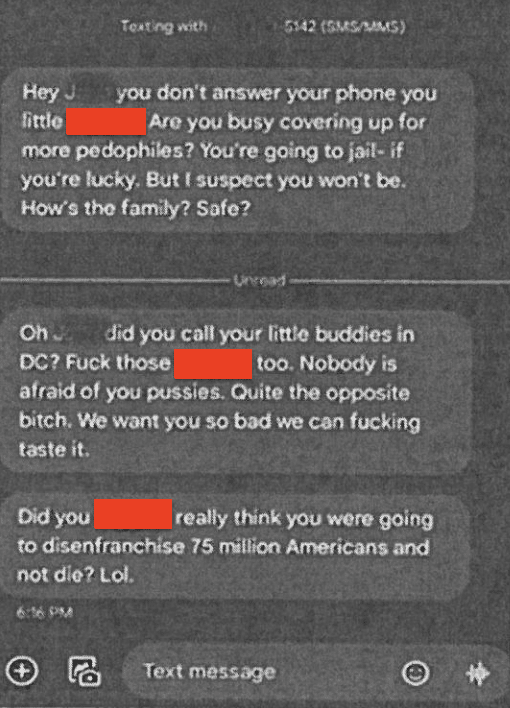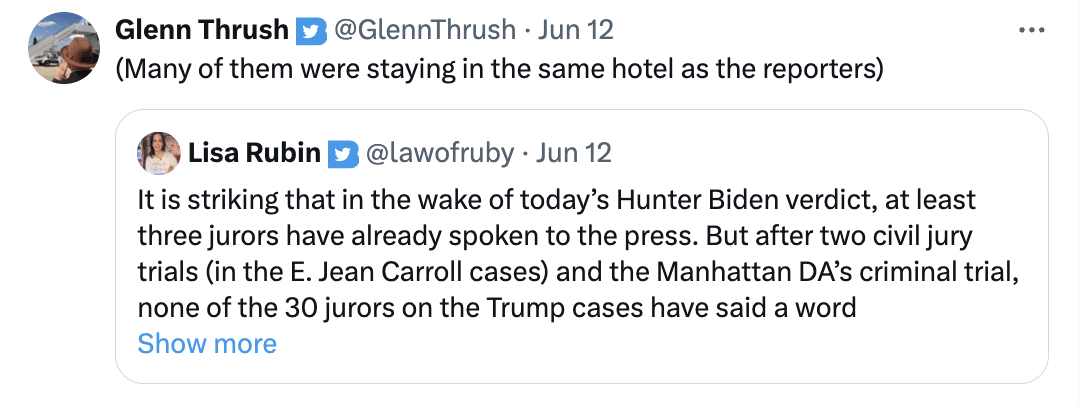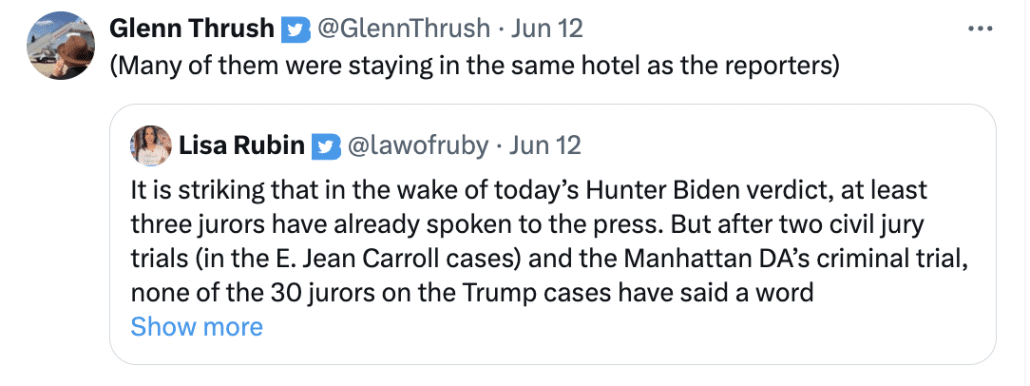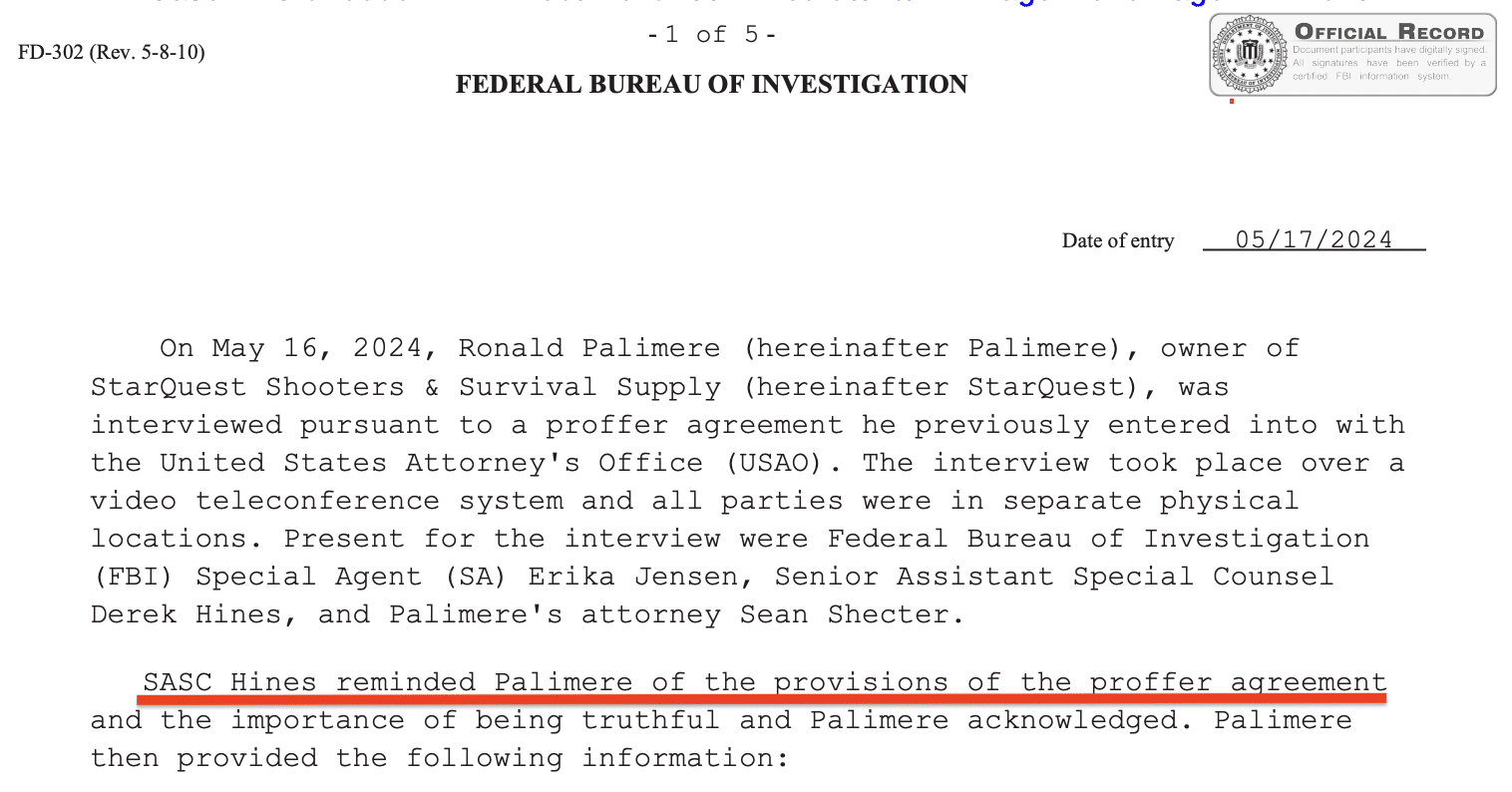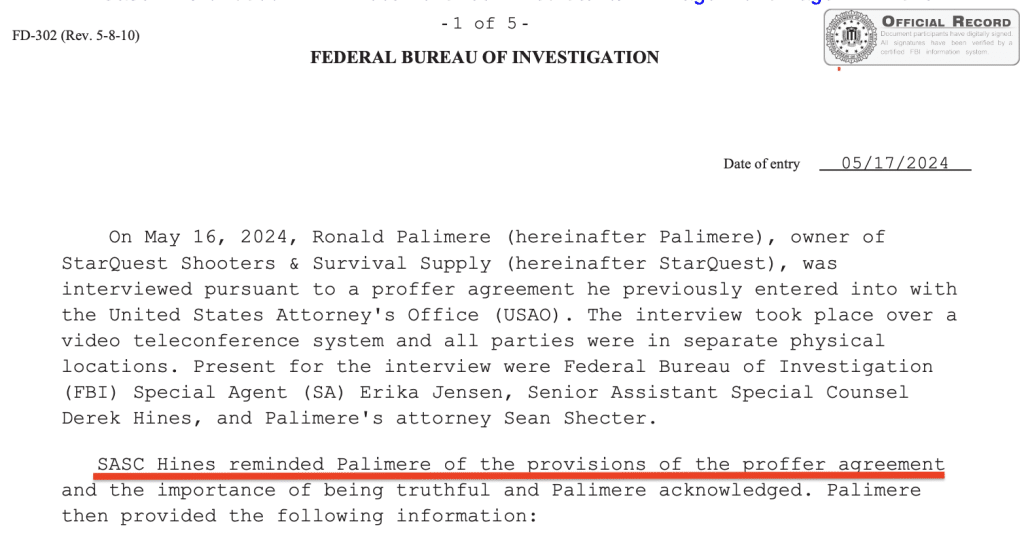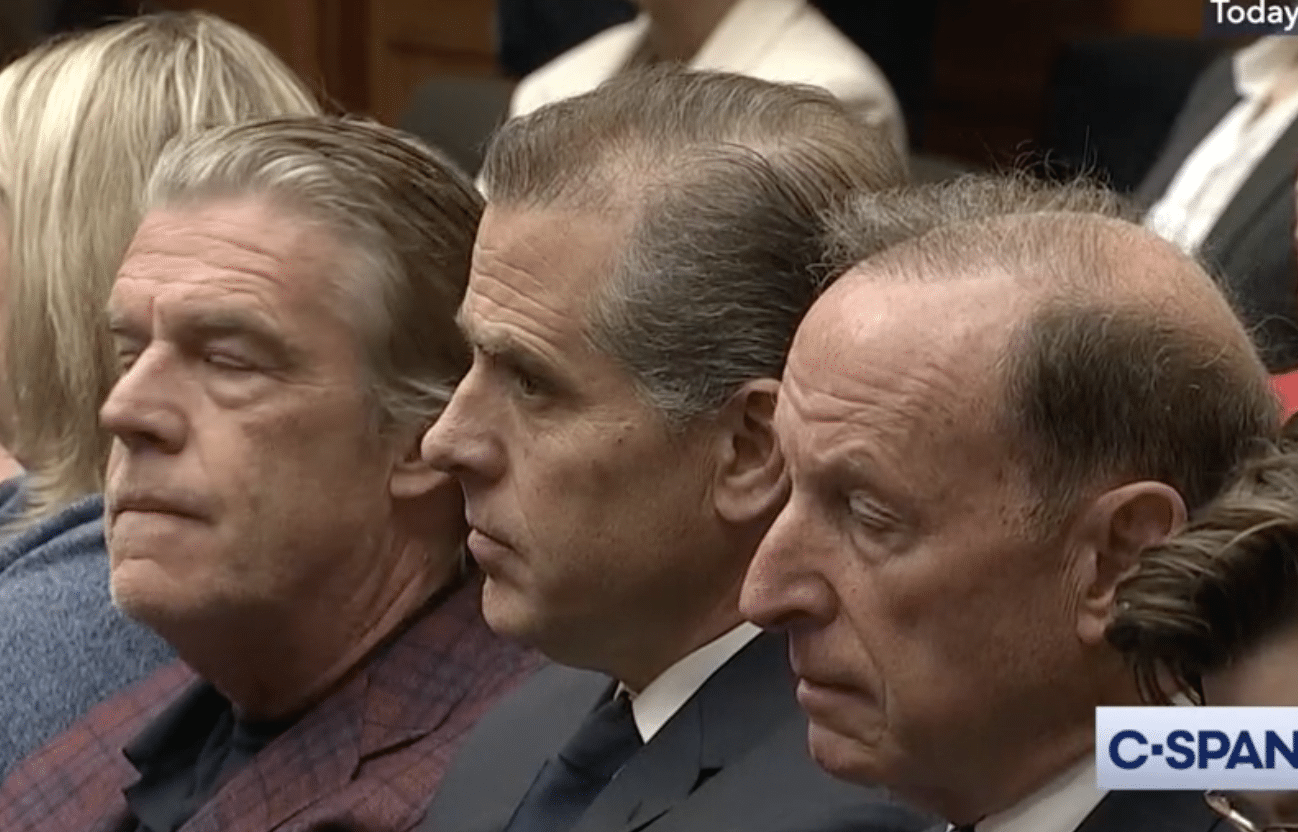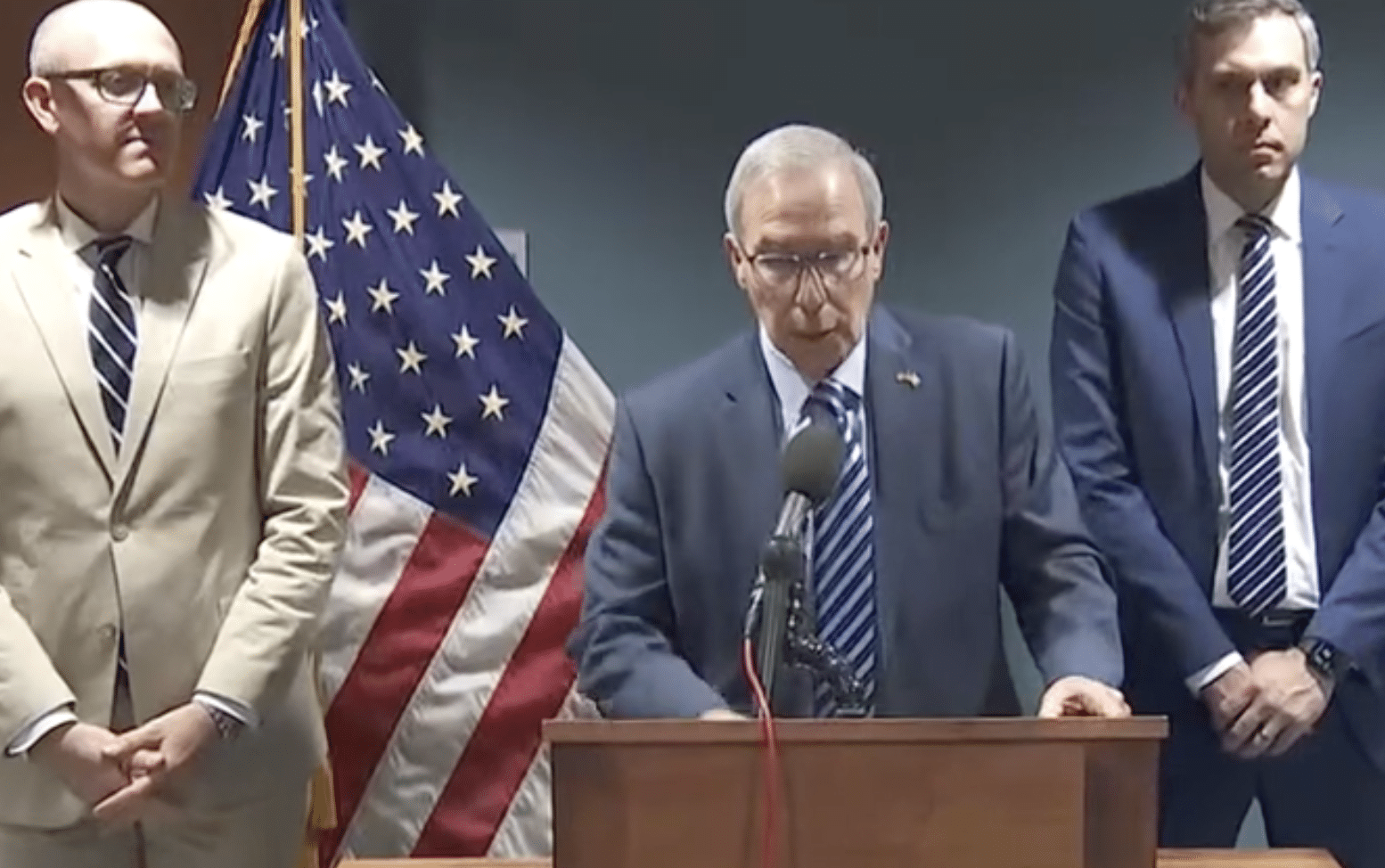Derek Hines Ensures that Two Likely Appeals Will Implicate His False Claims about Hunter Biden’s New Haven Crack Pipe
Hunter Biden filed three Rule 29 motions after the government rested in its case in chief against him in Delaware: a motion claiming there was insufficient evidence against him that is a formality in advance of other appeals, a claim about a recent change in the gun law that David Weiss convincingly argued is untimely, and his promised Second Amendment as-applied challenge.
While I disagree with virtually every commentator that a Second Amendment challenge is Hunter’s best chance at overturning his conviction, the as-applied challenge, more than his more general Second Amendment challenge, may prove important in years ahead– and it will take years, not least because Judge Noreika is unlikely to grant this challenge.
After all, one thing that makes Hunter’s prosecution almost unique is that there was and is no other legal judgment to implicate a tie between his addiction and the purchase of the gun, such as a related crime. There was no legal fact-finding, as there had been in imposing the restraining order on Rahimi, that he posed a threat. No court had found Hunter’s addiction to pose a threat to others. When a Biden-hating cop interviewed him after Hallie filed a police report, that cop did not prosecute — or even test — Hunter for doing drugs in the recent days.
On Friday, hours after the Supreme Court ruled against Zackey Rahimi’s challenge to restrictions on domestic abusers’ gun ownership, Derek Hines filed Special Counsel’s opposition to Hunter’s as-applied challenge. Unsurprisingly (and uncontroversially), the opposition relies heavily on Rahimi decision.
At trial, the government proved that the defendant was a heavy crack cocaine user who frequently posed a danger to himself and others. Section 922(g)(3), as applied to the defendant, falls squarely within “this Nation’s historical tradition of firearm regulation” and comports with the Second Amendment. New York State Rifle & Pistol Ass’n v. Bruen, 597 U.S. 1, 17 (2022). The Supreme Court’s decision today in United States v. Rahimi, No. 22-915 (U.S. June 21, 2024) clarified that Bruen only requires the government to show “the challenged regulation is consistent with the principles that underpin our regulatory tradition,” not that it is “identical” to a regulation at the founding. Slip op at 7. This significantly undermines the defendant’s reliance on United States v. Daniels, 77 F.4th 337 (5th Cir. 2023), which cites repeatedly to the now-reversed Fifth Circuit decision in Rahimi. As to the Fifth Amendment challenge, because § 922(g)(3) provides fair notice of the conduct it prohibits, it is not unconstitutionally vague. The Court should therefore deny the defendant’s motion.
But aside from that tactical opportunism, Hines doesn’t argue why Hunter himself posed a danger as a gun owner in October 2018, beyond pointing to the specific gun paraphernalia that, Abbe Lowell argued fairly convincingly, Gordon Cleveland upsold Hunter Biden to purchase.
Indeed, having argued assertively at trial that Hunter was a very high functioning crack addict, Hines relies on general policy arguments about addicts’ impairment to explain the danger of him owning a gun.
It is beyond dispute that firearm possession while operating under significant cognitive impairment in critical areas like attention, speed of processing, emotional regulation, inhibition control, and the ability to prioritize negative long-term consequences—not to mention psychological and physiological effects like panic, paranoia, tremors, or muscle twitches—presents a significant public safety risk. Nat’l Treasury Emps. Union v. Von Raab, 489 U.S. 656, 670-71, 674 (1989). The dangerousness of the defendant’s cocaine use is vividly shown by the evidence presented at trial, in which the loss of inhibition, emotional regulation, and self-control was demonstrated. See, e.g., Ex. 19 at 170-74 (discussing an episode in which the defendant drove a 500-mile road trip on which he wrecked a rental car when he hit the curb and spun into oncoming traffic, chain-smoked crack cocaine while driving, and chased a possibly hallucinatory barn owl at high speeds “through a series of tight, bounding switchbacks”).
As the Fried court noted, “unlawful drug use . . . causes significant mental and physical impairments that make it dangerous for a person to possess firearms.” 640 F. Supp. 3d at 1262-63. People who habitually use a substance like crack cocaine that impairs the ability to think, judge, and reason “are analogous to other groups the government has historically found too dangerous to have guns.” Id. at 1263; see also Wilson v. Lynch, 835 F.3d 1083, 1094 (9th Cir. 2016) (“It is beyond dispute that illegal drug users . . . are likely as a consequence of that use to experience altered or impaired mental states that affect their judgment and that can lead to irrational or unpredictable behavior.”); United States v. Carter, 750 F.3d 462, 469-70 (4th Cir. 2014) (finding “convincing” the government’s argument “that drugs ‘impair [users’] mental function . . . and thus subject others (and themselves) to irrational and unpredictable behavior’”); Yancey, 621 F.3d at 685 (“habitual drug abusers, like the mentally ill, are more likely to have difficulty exercising self-control, making it dangerous for them to possess deadly firearms”).
Perhaps the weirdest thing Hines does, as he did at trial, is to present evidence of Hunter’s later condition to substantiate his case, citing evidence of Hunter’s crack use in November and December 2018 and February and March 2019.
By March 2019, he claimed he had “no plan beyond the moment-to-moment demands of the crack pipe” and that this period followed “four years of active addiction.” Id. at 219-20.
[snip]
The defendant also discussed purchasing drugs in text messages with several individuals, showing a pattern of consistent drug use from spring 2018 to spring 2019. See, e.g., Ex. 18 at Row 1-22 (April 2018); id. at Row 23-65 (May 2018); id. at Row 66-72 (June 2018); id. at Row 73-85 (July 2018); id. at Row 86-87 (August 2018); id. at Row 169- 80 (November 2018); id. at Row 195-206 (December 2018); id. at Row 217-49 (February 2019). [my emphasis]
Admittedly, Hines would have had virtually all of this written before Rahimi. But the SCOTUS decision stresses temporary prohibitions, not permanent ones. And particularly absent a focus on Hunter’s drug use between the time of his August rehab and the gun purchase (Hines cites but does not quote Zoe Kestan’s testimony describing Hunter’s use in September 2018), Hines’ inclusion of so much evidence that post-dates Hunter’s ownership of a gun entirely makes the constitutional question more interesting.
Can an addict really lose his Second Amendment rights for future addiction?
And in the middle of one of those passages about Hunter’s future drug use months after he owned the gun, Hines includes the false claim he won’t stop making: that Hunter’s description of “me and a crack pipe in a Super 8” pertained to the state of his addiction in fall 2018, shortly after he owned a gun, rather than four months later, after Fox News pundit Keith Ablow’s treatment had made Hunter’s addiction worse.
The defendant characterized his daily experience in November 2018 as “me and a crack pipe in a Super 8 [motel], not knowing which the fuck way was up,” explaining that “[a]ll my energy revolved around smoking drugs and making arrangements to buy drugs.” Id. at 208. According to the defendant, by March 2019, he had “no plan beyond the moment-to-moment demands of the crack pipe.” Id. at 219-20.
Now, Hines’ obtuse misrepresentation of this passage presents more problems for a defense against a vindictive prosecution appeal. After all, by repeating this false claim six times (he repeated it in his response to the sufficiency challenge, as well, because apparently Hines doesn’t know “which the fuck way [is] up”), Hines is either confessing that he grossly misread the memoir which he successfully argued before Judge Noreika distinguished Hunter from other non-violent addicts who never get charged…
…Or he simply framed Hunter Biden before the grand jury, just like a corrupt Baltimore cop would frame someone by planting a crack pipe, claiming that conduct that took place long after the charged crime instead took place just weeks later.
Derek Hines had little of the evidence he used to prove his case at trial when he indicted Hunter Biden in September of last year. He didn’t have the cocaine residue in the leather pouch, he didn’t have a warrant to search Hunter’s text messages for evidence of gun purchases, he had some, but not all, of Kestan’s testimony.
Did he falsely tell the grand jury, as he told Maryellen Noreika and insinuated to the jury, that this passage pertains to “fall 2018”?
Did he make an easily disproven false claim to the grand jury to get that indictment? (The materials below show how easy this should be for a literate prosecutor to understand.)
But it is in Kestan’s testimony where his continued recitation of this line poses problems.
To win this constitutional challenge, Hines needs Kestan’s testimony that Hunter was doing drugs between his August rehab and his October gun purchase to be credible, because otherwise there are questions about the status of his addiction when he purchased the gun.
Q. And this was September the 18th of 2018, right?
A. I believe I was in the room by myself when I took that photo, so I think the day that we woke up there and he left later was the 17th.
Q. Okay. The day or — and the night he was there with you, did you see him smoking crack at The Freehand?
A. Yes.
[snip]
Q. All right. Now, when you get there on September the 20th of 2018, you’ve already testified he was smoking crack at The Freehand. Was he smoking crack at the Malibu house, when you were there in that week starting on September the 20th?
A. Yes.
But — on top of the full excerpt and spending records I place below, showing that Hines is wrong about his claims about the Super 8 passage — Kestan’s testimony debunks Hines’ unhealthy obsession with that line about the Super 8.
Q. And when you got there, where was he staying?
A. He was staying on an island called Plum Island, next to, or part of a place called Newburyport, Massachusetts, he said he was doing a ketamine infusion treatment.
Q. What did you understand that to mean?
A. It sounded like it was an outpatient type thing, where he would go to a clinic during daytime hours and get the treatment. And he was staying in a, like a rental house on his own otherwise.
Q. And when you went to visit him, did he in fact leave for whatever these treatments were?
A. Yes.
Hunter Biden wasn’t in New Haven in November 2018, when Derek Hines claims he was smoking the crack pipe Hunter described himself smoking in a Super 8 in New Haven (though in reality, only a few of the hotels at which he stayed in New Haven were as sketchy as a Super 8, and the only obvious one was a Quality Inn, not a Super 8).
He was, per Hines’ most important witness for this as-applied challenge, in a house out on Plum Island, outside Newburyport, still getting the Ketamine treatments that preceded the scene that Hines won’t stop falsely claiming happened in 2018.
Again, Hines’ persistent false claims about New Haven matter more in a hypothetical selective prosecution challenge, because Hines’ false claim was central to his assertions that there was reason to charge Hunter when he did.
But this as-applied constitutional challenge will implicate the timeline, what came before and what came after. And Derek Hines has persistently and obtusely made false claims about the timeline so he could rely on his favorite passage from Hunter’s book, including in his response to this as-applied challenge.
Memoir excerpt
The following excerpt shows the full context of Derek Hines’ favorite passage from Hunter Biden’s memoir. The italicized text was not included in the exhibit and audio-recording presented to the jury, which clearly places this description after his treatment from Ablow.
The therapy’s results were disastrous. I was in no way ready to process the feelings it unloosed or prompted by reliving past physical and emotional traumas. So I backslid. I did exactly what I’d come to Massachusetts to stop doing. I’d stay clean for a week, break away from the center to meet a connection I found in Rhode Island, smoke up, then return. One thing I did remarkably well during that time was fool people about whether or not I was using. Between trips up there, I even bought clean urine from a dealer in New York to pass drug tests.
Of course, that made all that time and effort ineffective. I didn’t necessarily blame the treatment: I doubt much good comes from doing ketamine while you’re on crack.
The reality is, the trip to Massachusetts was merely another bullshit attempt to get well on my part. I knew that telling my family I was in rehab meant I could claim they wouldn’t be able to contact me while I was undergoing treatment. I’d made my share of insincere rehab attempts before. It’s impossible to get well, no matter what the therapy, unless you commit to it absolutely. The Alcoholics Anonymous “Big Book”—the substance abuse bible, written by group founder Bill Wilson—makes that clear: “Half measures availed us nothing.”
By this point in my life, I’d written the book on half measures.
Finally, the therapist in Newburyport said there was little point in our continuing.
“Hunter,” he told me, with all the exasperated, empathetic sincerity he could muster, “this is not working.”
I headed back toward Delaware, in no shape to face anyone or anything. To ensure that I wouldn’t have to do either, I took an exit at New Haven.
To ensure that I wouldn’t have to do either, I took an exit at New Haven. For the next three or four weeks, I lived in a series of low-budget, low-expectations motels up and down Interstate 95, between New Haven and Bridgeport. I exchanged L.A.’s $400-a-night bungalows and their endless parade of blingy degenerates for the underbelly of Connecticut’s $59-a-night motel rooms and the dealers, hookers, and hard-core addicts—like me—who favored them. I no longer had one foot in polite society and one foot out. I avoided polite society altogether. I hardly went anywhere now, except to buy. It was me and a crack pipe in a Super 8, not knowing which the fuck way was up. All my energy revolved around smoking drugs and making arrangements to buy drugs—feeding the beast. To facilitate it, I resurrected the same sleep schedule I’d kept in L.A.: never. There was hardly any mistaking me now for a so-called respectable citizen. Crack is a great leveler.
New Haven area spending, February to March 2019
The following collects a non-exhaustive summary of money Hunter Biden spent in and around New Haven between February 11 and March 9, 2019. There is no other similar presence in New Haven that is easily identifiable.
This timeline happens to coincide with some of Hines’ favorite proof of drug purchases, as well.
February 11, 2019: Courtyard, New Haven
February 13, 2019: Courtyard, New Haven
February 13, 2019: Purchase at Reruns Bar and Grill, West Haven
February 13, 2019: Non-WF ATM withdrawal Broadway, New Haven
February 14, 2019: Purchase at Zachary’s Package Store, New Haven
February 14, 2019: Purchase at Citgo, New Haven
February 14, 2019: Non-WF ATM withdrawal Broadway, New Haven
February 14, 2019: New Haven Parking
February 15, 20199: ExxonMobil, West Haven
February 15, 2019: Non-WF ATM withdrawal Whitney Ave, Hamden
February 15, 2019: Non-WF ATM withdrawal Elm Street, West Haven (4X)
February 15, 2019: Non-WF ATM withdrawal Sawmill, West Haven (2X)
February 15, 2019: Purchase at New Haven Pizza, New Haven
February 15, 2019: Non-WF ATM withdrawal Highland, West Haven (4X)
February 15, 2019: Purchase at Sawmill Package Store, West Haven
February 15, 2019: ExxonMobil payment, West Haven
February 16, 2019: Carriage House, New Haven
February 16, 2019: Purchase at Around the Clock, New Haven
February 16, 2019: Purchase at Walgreens, New Haven
February 17, 2019: Carriage House, New Haven
February 17, 2019: Purchase at CVS, Hamden
February 17, 2019: Purchase at Tommys Tanning, Hamden
February 17, 2019: Non-WF ATM withdrawal Whitney Ave, Hamden
February 18, 2019: Carriage House, New Haven
February 18, 2019: Uber used on new device in Hamden
February 18, 2019: Non-WF ATM withdrawal Hamden Plaza, Hamden
February 18, 2019: Non-WF ATM withdrawal Dixwell Ave, Hamden
February 18, 2019: Non-WF ATM withdrawal Whitney Ave, Hamden
February 18, 2019: Purchase at McDonalds, Hamden
February 19, 2019: Non-WF ATM withdrawal Whitney Ave, Hamden
February 19, 2019: Uber ride from West Haven to Hamden
February 19, 2019: Booking.com The Blake Hotel, New Haven
February 19, 2019: Purchase at Drizly, New Haven
February 20, 2019: Uber ride from Milford to New Haven
February 21, 2019: Uber ride from New Haven to Milford
February 21, 2019: ATM withdrawal Hemingway Ave, New Haven
February 21, 2019: Purchase at Zachary’s Package Store, New Haven
February 21, 2019: Purchase at Fatface Corporation, New Haven
February 21, 2019: Purchase at Patagonia New Haven
February 21, 2019: Parking paid in New Haven
February 21, 2019: Parking paid in New Haven
February 23, 2019: Booking.com Marriott Worcester
February 24, 2019: Purchase at Whiskey on Water, Worcester
February 26, 2019: Uber ride from New Haven to New Haven
February 26, 2019: Purchase at Energy, Berlin
February 26, 2019: Purchase at Walgreens, New Haven
February 26, 2019: Purchase at Pizza Plus, New Haven
February 26, 2019: Non-WF ATM withdrawal College Street, New Haven
February 27, 2019: Non-WF ATM withdrawal College Street, New Haven
February 27, 2019: Non-WF ATM withdrawal George Street, New Haven
February 27, 2019: Uber ride from New Haven to New Haven
February 28, 2019: New sign-in to Twitter on Safari in New Haven
February 28, 2019: Non-WF ATM withdrawal Chapel Street, New Haven (2X)
February 28, 2019: Non-WF ATM withdrawal Church Street, New Haven
February 28, 2019: Non-WF ATM withdrawal George Street, New Haven
February 28, 2019: Non-WF ATM withdrawal Broadway, New Haven
February 28, 2019: Purchase at Meat&Co, New Haven
February 28, 2019: Purchase at Rite Aid, New Haven
February 28, 2019: Pick-up iPhone XR at Apple New Haven
February 28, 2019: Uber ride from Naugatuck to New Haven
February 28, 2019: Uber ride from New Haven to Naugatuck
March 3, 2019: ATM withdrawal Campbell Ave, New Haven
March 4, 2019: ATM withdrawal Foxon Blvd, New Haven
March 4, 2019: ATM withdrawal Hemingway Ave, New Haven
March 6, 2019: Purchase at Sunoco, Naugatuck
March 6, 2019: Purchase at Family Dollar, Naugatuck
March 6, 2019: ATM withdrawal Whalley Ave, New Haven
March 6, 2019: New sign-in to Twitter on Safari in New Haven
March 6, 2019: ATM withdrawal Church Street, New Haven (X4)
March 6, 2019: Purchase at Temple Wine and Liquor Store, New Haven
March 6, 2019: Uber ride from New Haven to New Haven
March 6, 2019: Booking.Com Omni Hotel New Haven
March 7, 2019: Uber ride from West Haven to New Haven
March 8, 2019: Uber ride from point to point in New Haven
March 8, 2019: ATM withdrawal Hemingway, East Haven
March 9, 2019: Quality Inn, New Haven (2X)

